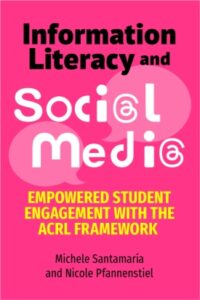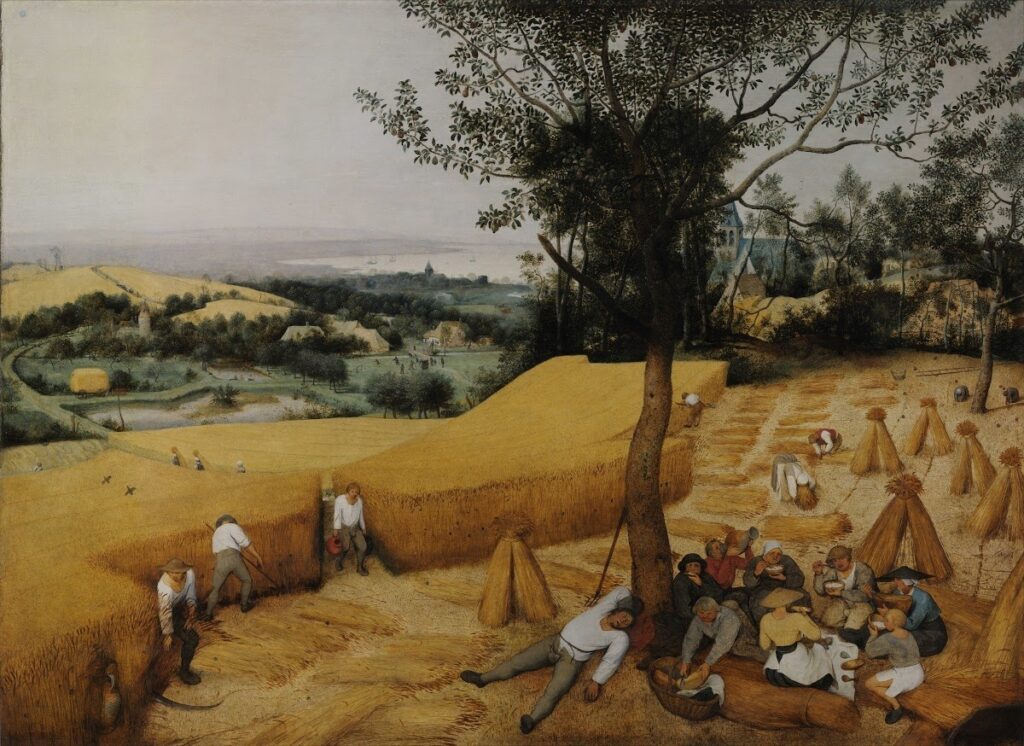I have gotten several emails from library students who feel that their programs are not teaching them enough about technology. The student I heard from a few days ago expressed concerns that she would be at a distinct disadvantage when she got out of school and wondered if I learned what I know about technology in library school. First of all, I don’t think I know that much about technology compared to many other librarian friends of mine, but I can tell you that I certainly did not learn what I do know in school. I was in a program where there was a “library science” component and an “information technology” component, and the two were very separate and led to different vocations. The technology classes usually had nothing to do with libraries and the library classes had nothing to do with technology. What I learned about technology was not related in any way to libraries, so I really had to make the connections myself. Even my Information Retrieval class, which fascinated and challenged me, had no mention of libraries or OPACs or anything (probably because it was taught by someone without a library background)! I only started to realize the value of what I’d learned in Information Retrieval when reading things by Roy Tennant and other critics of OPACs. (Don’t you just love those “lightbulb” moments?)
So I, too, was put at a “distinct disadvantage” by my library school, especially since my interests leaned toward the more blended librarian-type positions. My fantasy was to become a Distance Learning Librarian (funny how things work out!), which I figured required a lot more tech-savvy than I had coming into my final semester of my graduate degree. I realized I would have to take my education into my own hands if I wanted to be at all marketable in the academic library world. And I have a feeling this is how many of our colleagues learned to be the fabulous tech-savvy librarians they are.
The first thing I would recommend for anyone in the field is to learn to design a website. Whether you are a youth services librarian or a web services librarian, it is tremendously helpful to know some basic HTML. Knowing some CSS also can make your life a whole lot easier when you have to make changes to a site’s design. I can’t tell you how many job ads I saw for “traditional librarian” positions (youth services, reference, etc.) that wanted people with web design skills. When you have the sort of libraries that hire new employees once every 10 years or more, they are going to want to hire someone with some tech-savvy, since it’s likely that no one else on staff has those skills. What I learned in my web design classes I improved upon by simply creating more websites and by critiquing library websites. You can learn HTML in a book, but you won’t be able to design a decent website if you don’t practice, practice, practice. If you want to purchase a WYSIWYG website development program, I’d suggest Macromedia Dreamweaver, because it lets you see the code as you are designing the site. Most of the time I just hand code pages, since I don’t want to forget my HTML. It’s just like any language. Use it or lose it.
Obviously for some library positions you’ll need to know more than HTML and CSS. I’ve seen many job ads asking for PHP, Java, Javascript, MySQL, XML, Perl, and others. Probably if you don’t know any of those by your last semester of grad school, you’d be hard-pressed to learn any of them them by graduation. I plan to learn more programming languages in the future, but after trying to learn Java last Fall (which has to be the most frustrating language!), I need a break. In terms of books, I’m a big fan of the O’Reilly and Visual Quickstart/Quickpro series of books. The Visual Quickpro book on PHP and MySQL is fantastic (though a little dated at this point) as is the HTML Visual Quickstart book. But just like textbooks, what’s good for one person may not be good for another. Look through them in a bookstore if possible and see if the format works for you.
Another great thing to do is to play with new technologies. I never created any podcasts of my own (I hate my voice), but I downloaded plenty and even played around with Audacity a bit. I was interested in wikis so I created one (though one could more easily edit the wikipedia or something). I didn’t have any practical use for Jybe at the time I tested it, but I played around with it and became a fan. And in the future, it may be something I recommend to my supervisor. A big part of the reason I got my job was my experience with screencasting and knowledge of screencasting software. I learned about screencasting by reading about it in blogs, downloading trial versions of Captivate and Camtasia, and playing with them. I created a screencast for one of my interviews and everyone was really impressed with it. I just thought it would be a good thing to have some experience with. And it was. Depending on what sort of library work you’re interested in, play around with software that may be relevant to that job. It’s not only a good thing to put on your resume, but the software is often a lot of fun to play with (or maybe I’m just a geek).
The place in which I learned the most about library technologies was not in a classroom or in a book. It was in the blogosphere. I think I had first started reading Jessamyn’s and Jenny’s blogs last summer and realized that I didn’t know about half of what they were talking about. So I found other technology-related blogs while trying to figure out what in the world they were talking about. I found Steven’s blog. And Michael’s blog. And Andrea’s blog. And Sarah’s blog. Luckily there was a huge buzz about RSS at the time, so I learned about Bloglines, got myself account and kept adding to my collection of blogs. An RSS aggregator is one of the best keeping up accessories. When I was reading 5 blogs it wasn’t such a big deal to go to each site and see if anything new had been written. However, when the count gets up to 20, 50, 100 or more, the task becomes a bit unwieldy. An RSS aggregator simply collects new content from all of the RSS feeds you’re subscribed to and allows you to look at them all on the same page. So shortly after Jessamyn writes something new, I get to see it in my aggregator along with the new content from every other blog or journal I’m subscribed to. (I know to most of my readers this is redundant, but not everyone who reads blogs knows about RSS and aggregators. And they should because it will make their lives so much easier.)
Whatever one thinks about blogs, it is hard to deny that they are a great way to share information. The medium offers an immediacy that journals lack and gives people a space to talk about things in libraries that maybe wouldn’t fit into a journal. Thanks to the blogs I read, I have so many great ideas for my new job that I’m just about ready to burst!
I also think it’s important to read journals. At the moment I don’t read as many as I should — just the ones I can read for free online like Ariadne, D-Lib, Library Journal, CLIR Reports, and the Information Today journals, and the ones I get in the mail through my ALA, RUSA, and ACRL memberships. Once I start work and have access to plenty of library science journals, I’m sure my reading list will change, though I will continue to only read the articles that interest me.
Personally, I’m not a big fan of listservs or email lists. With blogging, you have one person or a small group of people who own the medium, so I think there is more of a commitment to creating something of quality. With a listserv, no one feels like they have to post because the medium belongs to everyone. I’ve never felt guilty about not posting to a listserv, but I do feel guilty when I don’t post to my blog. Maybe it’s just me, but I find that I learn much more about what people are doing at their institutions from blogs than from listservs and discussion groups. Also, I just hate getting the stuff in my Inbox. For a while, I resubscribed to some listservs in Bloglines (here’s how to do it), but I found it frustrating to wade through the 100 messages that were useless to me to find the two that were interesting. I think listservs can be a great place to get involved in an online community and make contacts. I guess I just haven’t found one that’s a good fit for me. In terms of online communities, I like models like WebJunction and wikis much better.
The main thing to remember is that you don’t have to read everything. Read what you’re interested in and not what you think you should be reading. Learn to scan articles and blogs for the interesting parts. You’re not being disloyal if you skip a blog post that holds no interest for you (as I’m sure many experienced “kept-up” librarians will do with this post). I used to drive myself crazy trying to read everything in my aggregator, but sometimes you just need to click on something, not read it, and move on. You’re not going to miss something huge. If it’s that important, it will be covered in other blogs. Get a del.icio.us or Furl account and save really meaty articles and posts for later. The point of this is to be aware of what’s going on in the library world, not to know everything.
The final piece of the puzzle is networking. Meet other people in the field. Meet people whom you admire. Comment on their blog, email them about an article they wrote, or IM them if they publish their handle (though I think email is better for a first introduction). I remember when I wrote to a blogger I admired (someone I am friends with now) I felt so embarassed. I figured that all sorts of people emailed them all the time and they wouldn’t want to get another dumb “fan” email. But the majority of the bloggers I’ve dealt with have been amazingly gracious and helpful people. They are happy to offer advice and encouragement. They like to communicate with people who are interested in the same things they are. Also be sure to go to conferences. This past ALA Conference was the first time I got to meet most of my fellow bloggers in the flesh. I was totally intimidated at first (to me, people like Michael Stephens, Walt Crawford, and Roy Tennant are rock stars!). But again, I found that everyone was just as down-to-earth and passionate about libraries and technology as I am. So don’t let yourself be intimidated by the people in the library world you admire. After all… we’re all just a bunch of librarians!
So to A.M.F. and all of the other folks who are trying to figure out how to be tech-savvy “kept-up” librarians, there is hope, even if your library school is not teaching you what you want to know.




Here, here! I took a couple tech classes in grad school, but sad to say didn’t learn a whole bunch of useful skills for libraries in them. Reasons why is a story for another time. But I completely agree on the utility of blogs and self-teaching to fill in the gaps.
I also emphasize about being intimidated by other bloggers at first. The first time I e-mailed Michael Stephens, I crafted each word carefully and tersely – like you I figured he must have tons and tons of e-mails a day. But that one e-mail started a chain of events that ultimately led me to the job I have lined up today. Get involved! Communicate!
The other thing to remember is that whatever technology you learn while you’re in library school won’t be what you need on the job. Part of the reason to learn new technologies is to learn how to learn them, and to demonstrate that you can.
Me, I’ve been on the job a week, and I’ve already signed up for a Java programming class at the community college. I’m also pitching myself head-first into Apache, Tomcat, and JBoss configuration and DSpace technicalities. (I have the ghost of a clue about Apache; know nothing about the rest of it.)
I knew I was in for something like this, and it didn’t bother me. If you’re going to live life in the tech lane, you pretty much have to be willing to dive in the deep end, repeatedly.
First: Great post and comments. This speaks volumes.
Second: We need to make sure that as a proffession we are always learning to LEARN. I am in awe of new librarians because they are so eager to dive into new things: projects, tech, etc. The best thing we could teach in Library school is how to ride waves of change and not be afraid of ther next big thing…
Couldn’t agree more, Chad, Dorothea and Michael. Fearless networking. Riding the waves of change. Growing your capacity to learn difficult things. Why aren’t any of those qualities taught in library school?
Awesome entry (as usual). Like you, I went to a school where librarianship and technology were on two different tracks leading to different types of careers. And like Chad, I took a few technology classes but any effort to tie them back into librarianship was on my own part, and often difficult. Reading blogs this first year out of grad school has been really instructional – people are always thinking about how to tie technologies (new and old) into library services, and it’s really refreshing (and inspiring!).
(I confess I’m still totally intimidated by other bloggers, though! There were a few people at the bloggers’ salon that I couldn’t even say hello to because I was so nervous.)
Rikhei, at the blogger party, I had to have Michael Stephens introduce me to Roy Tennant, because I was too nervous to go myself. It was like 7th grade all over again! What a geek!
Just remember, you’re a blogger too. And I’d be willing to bet you have “fans” as well. I know you have at least one (me).
Hey, I’m a senior in my high school and I am SOO in love with English–mainly just the Literature & book part of it–but my dad says that i can’t do anything much with just studying & reading literature in college. So I thought about being a librarian….lots of people recommended that idea to me & so I looked into it.. I love to read, I read almost, as some would say, consummably! It’s my passion to learn new things in literature about the world or whatever else & i want to pass that knowledge & desire on to people that enjoy the arts like i do.
Well, Abbey, librarianship is one option, but you could also think about teaching English at the high school or college level (though jobs in universities are pretty scarce nowadays). It’s great to see someone your age with such a passion for literature! The best thing you could do in college is explore everything you’re interested and see what ends up making the most sense for you. I thought I wanted to study neuroscience when I first got to college, but luckily I took lots of other classes and realized that I was more interested in History. I think your dad probably wants you to pick a college major that’s more “practical” than English, but if you think you want to teach or be a librarian, it’s a great thing to study. You definitely don’t have to start college knowing exactly what you want to do. Most people don’t even figure it out when they finish college!
That was the best post ever! As a current LIS student, I have come to the realization that all the “core” classes I’m required to take won’t leave much time for me to learn the really meaty stuff: technology itself. You’ve given a great list of places to start & that helps me (and others I’m sure) tremendously!
I would second what everybody else has said and add that I think every student currently in library school (or information school, or whatever the appellation is) would gain immeasurably by reading this post (and by reading the blogs and journals linked in it). If I had had this post in front of me when I started my program, I would have gotten off on a much stronger footing.
I can relate to Rikhei’s comment that tying the tech classes I took back into the core librarianship courses that I took was self-directed and very difficult. Most of my tech knowledge either pre-existed my librarian education or proceeded on my own pace and in my own time — or it was knowledge I got from the jobs I have worked, not from any particular course (although I do wish I had taken more tech courses in my program, many of which were very good).
I guess the bottom line is that there’s no magic formula for learning the skills that Meredith is talking about, and while it’s unfortunate that skills such as described above are not taught in library school, to an extent, I doubt they CAN be taught: if you aren’t already intrepid when you decide to become a librarian nowadays, you aren’t going to be taught to be intrepid by a graduate curriculum. The most you can expect is that grad school will make a point of emphasizing the necessity of being fearless and innovative and point you in the directions you need to go to experiment with and develop those traits.
Pingback: Library Voice » Keeping Up with Technology
Well said 🙂 FYI – I teach a course for UIUC GSLIS LEEP program – Web Design for Organizations and your posting confirms what I decided needed to be taught in that course. I forwarded your posting URL to my students enrolled this summer. Thank you 🙂
Diane
I am 9 days from finishing my MLS and taking Diane Kovacs class. See above post. I agreed with your post, but wondered where is the hardware component. For those in the small libraries we also have to have an understanding of networks, servers and all the rest–esp. if we are going to
participate intelligently in buying the hardware. I would expand your list to say that no one thinking of working in a library should be without the hardware side knowledge.
Catherine
A great post that I’m sorry to say I only stumbled across by doing a vanity search in Google’s new blog search engine. Meredith, I swear I have your blog on my “smart” FIrefox bookmarks, but somehow I missed it (sorry!). In any case, you have some great advice. I only wanted to respond to this sentence: “The main thing to remember is that you don’t have to read everything. ” Hear! Hear! That is exactly why I started Current Cites fifteen years ago. I wanted there to be an easier way to skim the cream, so I thought that if a team of volunteers could do it each month and publish the result then it would save others a lot of time and effort. Still going strong at http://lists.webjunction.org/currentcites/ . Sorry for the late comment, and keep up the good work!
Pingback: Information Wants To Be Free » Blog Archive » My year in blog